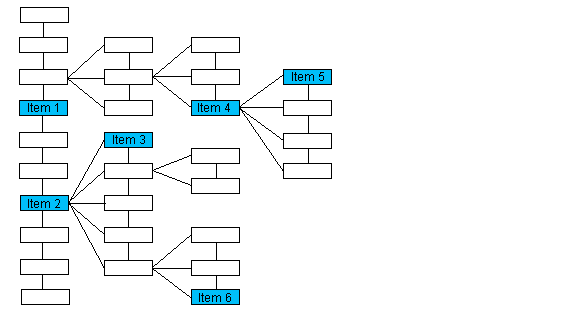
L_DicomGetChildElement
#include "Ltdic.h"
L_LTDIC_API pDICOMELEMENT L_DicomGetChildElement(hDS, pElement, bVolatile)
|
HDICOMDS hDS; |
/* a DICOM handle */ |
|
pDICOMELEMENT pElement; |
/* pointer to a DICOMELEMENT structure */ |
|
L_BOOL bVolatile; |
/* flag that indicates the type of element to retrieve */ |
Returns a pointer to the item in the Data Set that contains the first child of the specified item.
|
Parameter |
Description | |
|
hDS |
A DICOM handle. | |
|
pElement |
Pointer to a DICOMELEMENT structure that contains an item in the Data Set. | |
|
bVolatile |
Flag that indicates the type of child element to retrieve. Possible values are: | |
|
|
Value |
Meaning |
|
|
TRUE |
Retrieve any child element, volatile or non-volatile. |
|
|
FALSE |
Retrieve a non-volatile child element. |
Returns
|
!NULL |
A pointer to a DICOMELEMENT structure that contains the item in the Data Set that is the first child of the item specified in pElement. |
|
NULL |
pElement has no child items. |
Comments
The child is the offspring one level lower than the specified item. If the specified item has no child items, this function will return NULL. For example:

|
If the passed pointer points to : |
The function returns a pointer to : |
|
Item 1 |
NULL |
|
Item 2 |
Item 3 |
|
Item 4 |
Item 5 |
|
Item 6 |
NULL |
The following functions will also help you navigate the Data Set:
A volatile element is an element that can be changed or destroyed in the process of inserting or setting an image. A non-volatile element is an element that must be changed manually. It is not changed or destroyed by inserting or setting an image.
For example, a grayscale image has elements TAG_SMALLEST_IMAGE_PIXEL_VALUE, TAG_LARGEST_IMAGE_PIXEL_VALUE, etc. If the image is changed to a color image, these elements disappear and the following elements appear: TAG_RED_PALETTE_COLOR_LOOKUP_TABLE_DESCRIPTOR, etc. These are volatile elements since they are changed or destroyed when an image is changed or set.
To retrieve a child element that must be changed manually, i.e. is not volatile, set bVolatile to FALSE. To retrieve a child element that may be either volatile or non-volatile, set bVolatile to TRUE.
Required DLLs and Libraries
|
LTDIC For a listing of the exact DLLs and Libraries needed, based on the toolkit version, refer to Files To Be Included With Your Application |
See Also
Example
This example displays in a tree control the tree of the elements in the Data Set
#include <windowsx.h>
#include <commctrl.h>
L_VOID ShowTree(HWND hDlg, HDICOMDS hDS, HTREEITEM hParentItem, pDICOMELEMENT pParentElement)
{
TV_INSERTSTRUCT tvInsert;
TV_ITEM tvItem;
HTREEITEM hItem;
pDICOMELEMENT pElement;
pDICOMTAG pTag;
L_TCHAR szUnknown[]=TEXT("Unknown");
L_TCHAR *p;
if (pParentElement == NULL)
pElement = L_DicomGetFirstElement(hDS, pParentElement, TRUE, FALSE);
else
pElement = L_DicomGetChildElement(hDS, pParentElement, FALSE);
while (pElement != NULL)
{
pTag = L_DicomFindTag(pElement->nTag);
if (pTag != NULL)
{
p = pTag->pszName;
}
else
{
p = szUnknown;
}
tvItem.mask = TVIF_TEXT;
tvItem.pszText = p;
tvInsert.hParent = hParentItem;
tvInsert.hInsertAfter = TVI_LAST;
tvInsert.item = tvItem;
hItem = (HTREEITEM)SendMessage(hDlg, TVM_INSERTITEM, (WPARAM)0,
(LPARAM)(LPTV_INSERTSTRUCT)&tvInsert);
if (L_DicomGetChildElement(hDS, pElement, FALSE) != NULL)
{
ShowTree(hDlg, hDS, hItem, pElement);
}
pElement = L_DicomGetNextElement(hDS, pElement, TRUE, FALSE);
}
}
L_INT DicomGetChildElementExample(HWND hDlg)
{
HDICOMDS hDS;
hDS = L_DicomCreateDS(NULL);
L_DicomInitDS(hDS, CLASS_XA_BIPLANE_IMAGE_STORAGE_RETIRED, 0);
ShowTree(hDlg, hDS, TVI_ROOT, NULL);
L_DicomFreeDS(hDS);
return DICOM_SUCCESS;
}